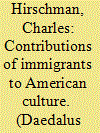| Srl | Item |
| 1 |
ID:
125138


|
|
|
|
|
| Publication |
2013.
|
| Summary/Abstract |
The standard account of American immigration focuses on the acculturation and assimilation of immigrants and their children to American society. This analysis typically ignores the significant contributions of immigrants to the creation of American culture through the performing arts, sciences, and other cultural pursuits. Immigrants and their children are not born with more creative talents than native-born citizens, but their selectivity and marginality may have pushed and pulled those with ability into high-risk career paths that reward creative work. The presence of large numbers of talented immigrants in Hollywood, academia, and the high-tech industries has pushed American institutions to be more meritocratic and open to innovation than they would be otherwise.
|
|
|
|
|
|
|
|
|
|
|
|
|
|
|
|
| 2 |
ID:
140558


|
|
|
|
|
| Summary/Abstract |
What are relationships between epidemics, national security, and US immigration policy? This question is important because it sheds light on transnational or nontraditional security areas, American immigration policy, and a pressing issue for US leaders who have recently faced epidemics such as the West Africa Ebola outbreak that began in 2013. This article answers it and lays ground in the area by reviewing epidemics in world history, using International Relations and Security Studies works to specify dangers of contagions for states, and identifying three general immigration measures that American leaders have utilized from the seventeenth century to the present day to protect against contagions, which are (1) policies restricting entrance of foreigners thought to carry specified diseases, (2) the isolation or quarantining of immigrants with contagious disease, and (3) delegating the President with authority to stop immigration in the event of an epidemic abroad. This study has implications for research and contemporary US immigration policy.
|
|
|
|
|
|
|
|
|
|
|
|
|
|
|
|